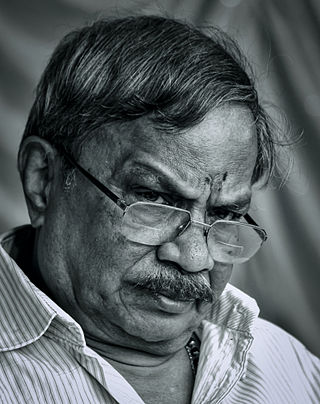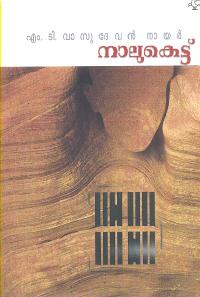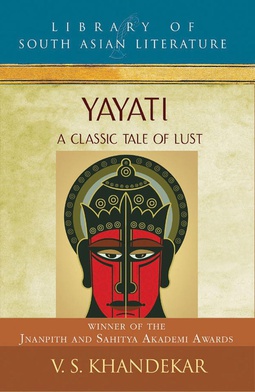Related Research Articles

Madath Thekkepaattu Vasudevan Nair, popularly known as M.T., is an Indian author, screenplay writer and film director. He is a prolific and versatile writer in modern Malayalam literature, and is one of the masters of post-Independence Indian literature. At the age of 20, as a chemistry undergraduate, he won the prize for the best short story in Malayalam at World Short Story Competition conducted by The New York Herald Tribune. His first major novel Naalukettu, written at the age of 23, won the Kerala Sahitya Akademi Award in 1958. His other novels include Manju (Mist), Kaalam (Time), Asuravithu and Randamoozham. The deep emotional experiences of his early days have gone into the making of MT's novels. Most of his works are oriented towards the basic Malayalam family structure and culture and many of them were path-breaking in the history of Malayalam literature. His three seminal novels on life in the matriarchal family in Kerala are Naalukettu, Asuravithu, and Kaalam. Randamoozham, which retells the story of the Mahabharatha from the point of view of Bhimasena, is widely credited as his masterpiece.

Thakazhi Sivasankara Pillai, popularly known as Thakazhi

Parutholli Chalappurathu Kuttikrishnan, popularly known by his pen name Uroob was an Indian writer of Malayalam literature. Along with Basheer, Thakazhi, Kesavadev, and Pottekkatt, Uroob was counted among the progressive writers in Malayalam during the twentieth century. He was known for his novels such as Sundarikalum Sundaranmarum and Ummachu, short stories like Rachiyamma and the screenplays of a number of Malayalam films including Neelakuyil, the first Malayalam feature film to receive the National Film Award. He was a recipient of several honours including Kendra Sahithya Academy Award and the inaugural Kerala Sahitya Akademi Award for Novel.

Kandanisseri Vattamparambil Velappan Ayyappan or V. V. Ayyappan, better known by his pen name Kovilan, was an Indian Malayalam language novelist and freedom fighter from Kerala. He is considered one of the most prolific writers of contemporary Indian literature. In all, he had authored 11 novels, 10 collections of short stories, three essays and a play.

K. V. Ramakrishna Iyer, better known by his pen name, Malayattoor Ramakrishnan, was an Indian writer of Malayalam literature, cartoonist, lawyer, judicial magistrate, and Indian Administrative Service (IAS) officer. He was best known for his novels, short stories and biographical sketches and his works include Yanthram, Verukal, Yakshi and Service Story – Ente IAS Dinangal. He received the Kerala Sahitya Akademi Award for Novel in 1967. He was also a recipient of the Vayalar Award in 1979.

George Varghese Kakkanadan, commonly known as Kakkanadan, was an Indian short-story writer and novelist in the Malayalam language. His works broke away from the neo-realism that dominated Malayalam literature through the 1950s and 1960s. He is often credited with laying the foundation of modernism in Malayalam literature. He is a recipient of Kendra Sahitya Akademi Award and Kerala Sahitya Akademi Awards in addition to numerous other awards and recognitions.
N. P. Mohammed, popularly known by his initials N. P., was an Indian novelist, short story writer and screenwriter of Malayalam language. Along with his contemporaries like M. T. Vasudevan Nair, O. V. Vijayan, Kakkanadan, and Madhavikutty, he was known to have been one of the pioneers of modernist movement in Malayalam fiction. He was the president of Kerala Sahitya Akademi and a recipient of several awards including Kendra Sahitya Akademi Award, Kerala Sahitya Akademi Award for Story, Kerala Sahitya Akademi Award for Novel, Lalithambika Antharjanam Award, Padmaprabha Literary Award and the Muttathu Varkey Award.

Kizhakkepainummoodu Easo Mathai, better known by his pen name Parappurath (1924–1981), was an Indian novelist, short story writer and screenwriter who wrote in the Malayalam language. His body of work comprises 20 novels, 14 short story anthologies and 15 screenplays. He was a recipient of the Kerala Sahitya Akademi Award for Story (1966), Kerala Sahitya Akademi Award for Novel (1968) and Kerala State Film Award for Best Story, amongst other honours.
Daivathinte Vikrithikal is a 1992 Indian Malayalam-language drama film directed by Lenin Rajendran, who also co-wrote the screenplay with M. Mukundan, based on Mukundan's novel of the same name. The film tells the story of Alphonso, a man who chooses to suffer a slow, torturous life in his little village, Mahe, in preference to fortunes and pleasures away from it. The film stars Raghuvaran, Srividya, Rajan P. Dev and Malavika.

Naalukettu is a Malayalam novel written by M. T. Vasudevan Nair. Published in 1958, it was MT's first major novel. The title attributes to Nālukettu, a traditional ancestral home (Taravad) of a Nair joint family. Like many other novels written by MT, Naalukettu is also set against the backdrop of the crumbling matrilineal order of Kerala in a newly independent India.

Smarakasilaka is a Malayalam novel written by Punathil Kunjabdulla in 1977. The story of the novel is woven around a mosque and its surroundings. The key figure is Khan Bahadur Pookkoya Thangal of the rich Arakkal family whose character is a rare mixture of dignity, benevolence and insatiable lust.
Ara Nazhika Neram is a 1970 Malayalam film, directed by K. S. Sethumadhavan and written by Parappurath, based on his own novel Ara Nazhika Neram. Parappurath also played a minor role in the film. The story of the film revolves around an Orthodox Christian family headed by Kunjenachan, a ninety-year-old patriarch who lives his life by The Book. The film also features Prem Nazir, Sathyan, Ragini, Sheela, K. P. Ummer, Adoor Bhasi and Ambika Sukumaran.

Agnisakshi is a Malayalam novel written by Lalithambika Antharjanam. Originally serialised in Mathrubhumi Illustrated Weekly, it was published as a book by Current Books in 1976. It tells the story of a Nambudiri woman, who is drawn into the struggle for social and political emancipation but cannot easily shake off the chains of tradition that bind her. The novel was concerned with implied criticism of aspects of social structure and behaviour.
God's Mischief is a 1989 Malayalam novel written by M. Mukundan. Like most of Mukundan's works, this novel too is based in Mayyazhi, better known once as Mahé, the French colony after it was decolonised. The story centres on a magician, Father Alfonso, his daughter, Elsee and an Ayurveda Vaidyar Kumaran and his two twin sons and how their life changes after the land is decolonised. The novel won the Kendra Sahitya Akademi Award and the N. V. Prize. It was adapted into a film by noted director Lenin Rajendran in 1992.

T. V. Kochubava (1955–1999) was an Indian writer of Malayalam literature, known for his novels and short stories. He published twenty three books covering the genres of novels, short stories, translations and plays and was a recipient of a number of awards including the Kerala Sahitya Akademi Award for Novel in 1996, besides several other honours.
Nirupama Borgohain is an Indian journalist and novelist in the Assamese language. She is a Sahitya Akademi award winner, best known for her novel Abhiyatri. In the year 2015, she decided to return her Sahitya Akademi award in protest against the rising intolerance in the society. She was a recipient of the Assam Valley Literary Award.

Ini Njan Urangatte is a Malayalam-language novel written by P. K. Balakrishnan in 1973. The novel's inspiration is the Sanskrit epic Mahabharata. It may be regarded as a historically notable Malayalam-language novel as it has become a yardstick for epic Malayalam fiction, spawning many Mahabharata based-novels.

S. Hareesh is an Indian writer, translator and screenwriter of Malayalam literature and cinema. He is best known for his short stories and his acclaimed but controversial debut novel, Meesa, which explores caste in Kerala in the mid-20th century. The novel, initially serialized in the Mathrubhumi weekly, was withdrawn after protests by right-wing Hindutva groups and caste-community organizations for “maligning Hindu women and temple priests.”. It was later published as a full novel by DC Books. Hareesh is the recipient of several honours including the Kerala Sahitya Akademi Award for Novel and the Geetha Hiranyan Endowment of the Kerala Sahitya Akademi. In November 2020, the English translation of Meesa, titled Moustache, was selected for the JCB Prize for Literature, the Indian literary award with the highest prize money.
T. N. Gopinathan Nair, was an Indian dramatist, novelist, poet, screenwriter and biographer of Malayalam language. One of the prolific among Malayalam playwrights, Nair published 39 plays, besides his four novels, four poetry anthologies and five biographies. He was a member of the council of Kerala Sahitya Akademi and held the char of the Kerala Sangeetha Nataka Akademi. His drama, Pareeksha, received the Vikraman Nair Trophy for the best drama and the Kerala Sahitya Akademi selected his work, Sakshi, for their annual award for drama in 1979.

Yayati is a 1959 Marathi-language mythological novel by Indian writer V. S. Khandekar. One of Khandekar's best-known works, it retells the story of the mythical Hindu king, Yayati, from the Hindu epic the Mahabharata. The novel has multiple narrators, and poses several questions on the nature of morality. Scholars have analysed its hero, Yayati, as a representation of modern man. Accepted as classic of Marathi literature, Yayati has won several awards, including the Sahitya Akademi Award in 1960 and the Jnanapith Award in 1974.
References
- ↑ Amaresh Datta (1988). Encyclopaedia of Indian Literature: A-Devo - Volume 1. p. 752.
- ↑ Vijayakumar, B. (26 July 2010). "ARANAZHIKANERAM 1970". The Hindu. Retrieved 22 January 2019.